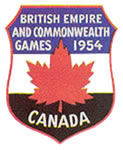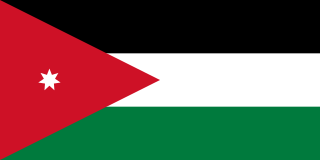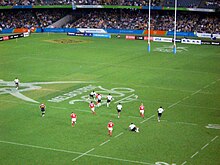
The 1980 Summer Olympics, officially known as the Games of the XXII Olympiad and commonly known as Moscow 1980, were an international multi-sport event held from 19 July to 3 August 1980 in Moscow, Soviet Union, in present-day Russia. The games were the first to be staged in an Eastern Bloc country, as well as the first Olympic Games and only Summer Olympics to be held in a Slavic language-speaking country. They were also the only Summer Olympic Games to be held in a self-proclaimed communist country until the 2008 Summer Olympics held in China. These were the final Olympic Games under the IOC Presidency of Michael Morris, 3rd Baron Killanin before he was succeeded by Juan Antonio Samaranch, a Spaniard, shortly afterwards.

The 1990 Commonwealth Games were held in Auckland, New Zealand from 24 January – 3 February 1990. It was the 14th Commonwealth Games, and part of New Zealand's 1990 sesquicentennial celebrations. Participants competed in ten sports: athletics, aquatics, badminton, boxing, cycling, gymnastics, judo, lawn bowls, shooting and weightlifting. Netball and the Triathlon were demonstration events.

The 1954 British Empire and Commonwealth Games were held in Vancouver, British Columbia, from 30 July to 7 August 1954. These were the first games since the name change from British Empire Games took effect in 1952.

Scotland is one of only six countries to have competed in every Commonwealth Games since the first Empire Games in 1930. The others are Australia, Canada, England, New Zealand and Wales.

Canada has competed at 23 Summer Olympic Games, missing only the inaugural 1896 Summer Olympics and the boycotted 1980 Summer Olympics. The nation made its debut at the 1900 Summer Olympics. Canada competes under the IOC country code CAN.

Australia first competed at the Games, then titled the British Empire Games, in 1930; and is one of only six countries to have sent athletes to every Commonwealth Games. The others are Canada, England, New Zealand, Scotland, and Wales. Australian athletes competed for Australasia at the 1911 Festival of the Empire, the forerunner to the British Empire Games.

Jordan have competed at all-but-one Asian Games since their first participation in 1986, with the exception of the 1990 edition in Beijing. Including the 2018 edition, Jordan have won 45 medals, including five gold, 16 silver and 24 bronze medals. These have been won in six sports: Taekwondo (24), Karate (nine), Jujitsu (five), Boxing (five), Bodybuilding (one) and Wrestling (one).
This article contains a chronological summary of major events from the 2011 Pan American Games in Guadalajara, Mexico.

The Commonwealth Paraplegic Games were an international, multi-sport event involving athletes with a disability from the Commonwealth countries. The event was sometimes referred to as the Paraplegic Empire Games and British Commonwealth Paraplegic Games. Athletes were generally those with spinal injuries or polio. The Games were an important milestone in the Paralympic sports movement as they began the decline of the Stoke Mandeville Games' dominating influence. The event was first held in 1962 and disestablished in 1974. The Games were held in the country hosting the Commonwealth Games for able-bodied athletes, a tradition eventually fully adopted by the larger Olympic and Paralympic movements.
This article contains a chronological summary of major events from the 2012 Summer Olympics in London.

Canada competed in the 2014 Commonwealth Games in Glasgow, Scotland from July 23 to August 3, 2014. It was the nation's 20th appearance at the Commonwealth Games, having competed at every Games since their inception in 1930. Canada competed in 16 out of 17 sports with the only exception being netball. Canada's team consisted of 265 athletes and 100 support staff, the largest team for a games not hosted by the country. On September 12, 2012 former Commonwealth Games medalist Chantal Petitclerc was named as the Chef de mission of the team, marking the first time a former para athlete was named to the post.

Australia competed at the 2018 Commonwealth Games in Gold Coast, Queensland between 4 and 15 April 2018. It was Australia's 21st appearance at the Commonwealth Games, having competed at every Games since their inception in 1930. Australia previously hosted the Games four times – 1938 Sydney, 1962 Perth, 1982 Brisbane and 2006 Melbourne.

New Zealand competed at the 2018 Commonwealth Games in Gold Coast, Australia, from 4 to 15 April 2018. It was the nations's 21st appearance at the Commonwealth Games, having competed at every Games since their inception in 1930. The New Zealand team consisted of 251 athletes, 130 men and 121 women, across 17 sports.

The second Commonwealth Paraplegic Games were held in Kingston, Jamaica from 14 to 20 August 1966. There were 133 athletes from 10 countries. The Games were opened by Prince Philip.

The fourth Commonwealth Paraplegic Games were held in Dunedin, New Zealand from 13 to 19 January 1974. The Games were opened by Sir Denis Blundell, Governor-General of New Zealand.
The 2018 Commonwealth Games, was a multi-sport event held in Gold Coast, Queensland, Australia, between 4 and 15 April 2018. 275 medal events were held at these games.

Great Britain, or in full Great Britain and Northern Ireland, the team of the British Olympic Association (BOA), which represents the United Kingdom, competed at the 2020 Summer Olympics in Tokyo. Originally scheduled to take place from 24 July to 9 August 2020, the Games were postponed to 23 July to 8 August 2021, because of the COVID-19 pandemic.

Canada competed at the 2022 Commonwealth Games in Birmingham, England. This was Canada's 22nd appearance at the Commonwealth Games, having competed at every Games since their inception in 1930.

Katie Crowhurst is a British visually impaired para athlete who has competed internationally for Great Britain in both para swimming and paratriathlon.
The 2022 Commonwealth Games were held in Birmingham, England, from 28 July to 8 August 2022.













